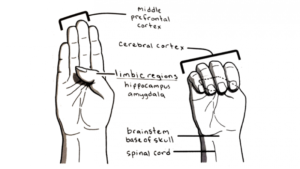How to Help Children Regulate Their Emotions

Let’s be honest, we all flip our lids sometimes. We’re human—we’re going to get angry, overwhelmed, anxious, and/or defiant. Children are human too, and they need help learning how to regulate and cope with their big emotions.
The “flipped lid” analogy helps parents understand what is happening in a child’s brain when they are having a big reaction (a fit, tantrum, hitting, screaming, etc.). The prefrontal cortex is where our executive functioning is located. This part of the brain helps us use reason, socially acceptable behavior, and mindfulness. The amygdala is our emotional brain. It processes sensory information and decides if it is threatening. When the amygdala senses something dangerous or upsetting, it takes over the prefrontal cortex and creates a fight or flight response. Once the amygdala has taken over the prefrontal cortex (or the lid is flipped), there is no way to reason with the child.

In these moments of complete dysregulation, the only thing to do is help your child calm down (put their lid back on). What helps you calm down? How can you give that same respect and opportunity to your child? Personally, when I start feeling overwhelmed or dysregulated, I want soft voices, a gentle rub on the back, a hug, or some quiet time by myself. What would it be like to try some of those things with your child next time they lose their marbles?
How can I help my child regulate?

Modeling! Children are always watching and learning. How you regulate when you get upset or overwhelmed is showing them how to handle their own big feelings. Show your child that it’s okay to cry, to take long breaths, or to take some alone time. Show your children what you do to put your lid back on.
Be with them! Often when children start throwing fits, misbehaving, or screaming, parents will resort to punishing or threatening them. In these moments, helping children name what they’re feeling can be relieving for them. “You are really angry, mommy is here for you” or “That made you sad, can I give you a hug?”
Give them alternatives! Kiddos will find ways to get their needs met. Maybe when they feel angry, they punch their little brother. Or perhaps when they’re asked to share, they scream and throw the toy across the room. When your child hits their little brother, you can say, “You are really angry. Your brother isn’t for hitting, if you want to hit something you can go beat up that teddy bear.” Having appropriate alternatives for your child’s inappropriate behaviors teaches them healthier ways of expressing themselves.
Teach them! If your child is old enough to understand the flipped lid analogy, explain it to them. Help them come up with ways they can bring their own lid down. Let them know they can always ask for help from you too.
What are some ways to encourage long term emotional regulation?
 Being proactive and helping keep children regulated throughout their day can help reduce the amount of times their lids get flipped.
Being proactive and helping keep children regulated throughout their day can help reduce the amount of times their lids get flipped.
- REST! In today’s society, we are always going, going, going. Make time for rest throughout your child’s day. After school before they start homework or go to extracurricular activities, give them time to play or read quietly in their room. Often tantrums and big emotions happen after a child has already been going, going, going for most of the day. Giving them time to decompress and slow down can decrease their stress levels so they are emotionally ready for homework, extracurricular activities, or household chores.
- PLAY! Play is a child’s natural way of expressing themselves. Encouraging them to play outside or with their toys can be a great way for them to let go of stress. Coloring or working on art projects can reduce their stress levels as well. Playing with them is even better! Screen time does not equal play. Try to limit your child’s screen time to the CDC’s recommended 2 hours per day. Encourage them to go outside or play with their toys.
- LISTEN! Listening to your child’s concerns and helping them name their feelings can be really powerful. Help them understand the feelings sadness, anger, joy, disappointment, anxiety, nervousness, disgust, and fear. When their lid is not flipped, you can brainstorm with them ways of expressing and handling their emotions when they feel too big.
 Most importantly be patient! Not just with your child, but with yourself also. Learning new skills will take time for both of you. Showing your child and yourself grace and patience will encourage both of you to keep trying.
Most importantly be patient! Not just with your child, but with yourself also. Learning new skills will take time for both of you. Showing your child and yourself grace and patience will encourage both of you to keep trying.
Interested in learning more? Contact us about joining a parenting class!

